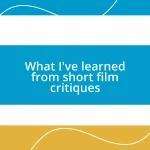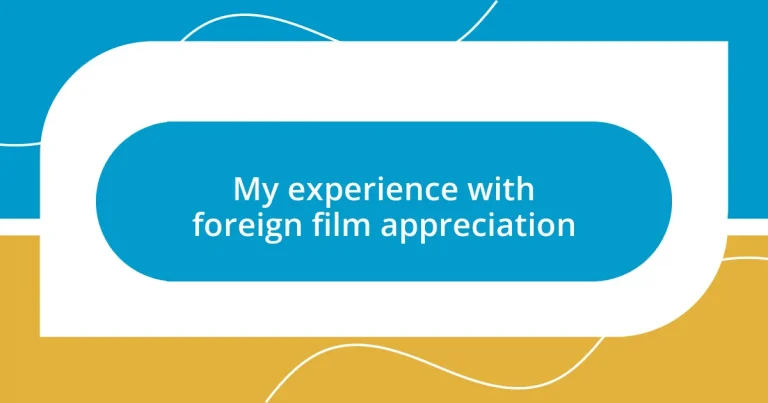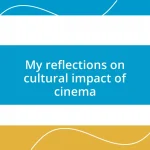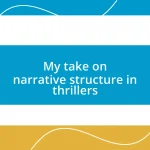Key takeaways:
- Appreciating foreign films enriches cultural understanding and highlights universal themes, transcending language barriers through emotional storytelling.
- International film festivals provide insights into diverse cinematic voices and foster connections between filmmakers and audiences, emphasizing the importance of cultural context.
- Subtitles enhance the viewing experience by facilitating deeper engagement with dialogue and cultural nuances, transforming passive watching into an active exploration of narratives.
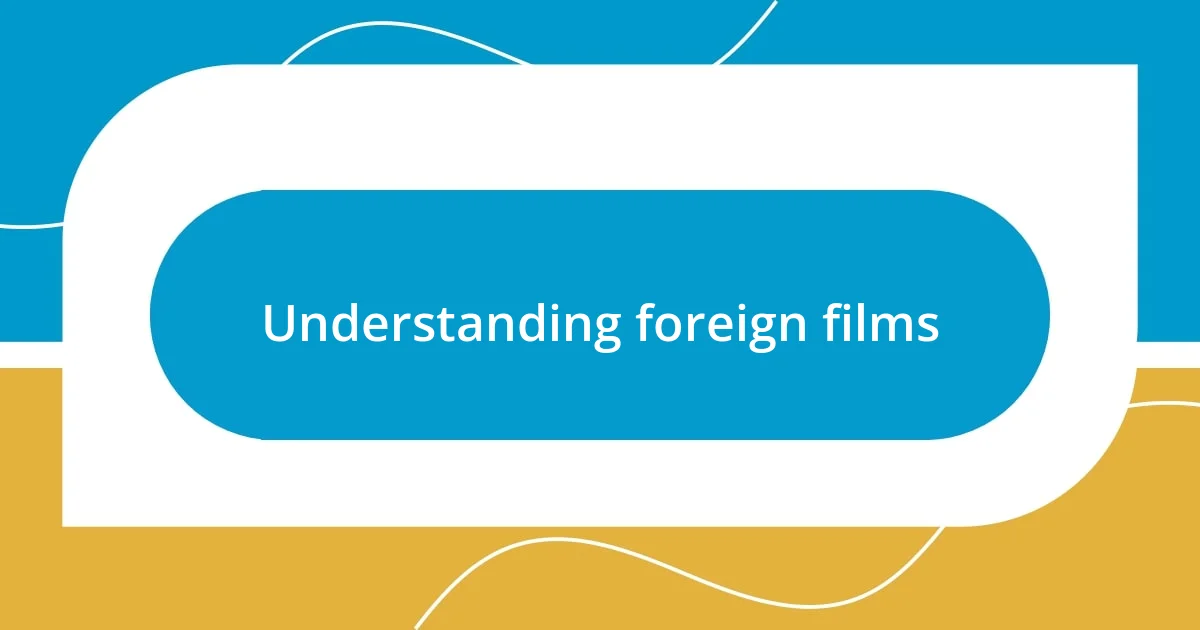
Understanding foreign films
Understanding foreign films involves immersing oneself in a mosaic of diverse cultures and perspectives. I still vividly recall the first time I watched a Japanese film—it felt like entering a world where traditions and modernity intertwine so beautifully. The emotions portrayed in “Ikiru,” for example, left a profound impact on me; it made me reflect on my own life choices and the universal urgency to find meaning.
One of the challenges in appreciating foreign films is overcoming the language barrier. I remember how hesitant I felt to dive into films with subtitles, fearing I might miss nuances that were lost in translation. But with each film, I discovered that the emotions conveyed through visuals often transcend words. Have you ever been moved by a simple gesture or expression that spoke volumes? For me, it highlighted the beauty of storytelling, reminding me that sometimes less is more.
Moreover, understanding cultural context enriches the viewing experience significantly. When I watched “Amélie,” I found myself enchanted by the whimsical portrayal of Parisian life, which sparked my curiosity about French culture. It made me wonder: how many layers of understanding are we missing when we only stick to familiar narratives? As I delved deeper into foreign films, I realized that they offer not just entertainment but also an invitation to look beyond the familiar and embrace perspectives different from our own.
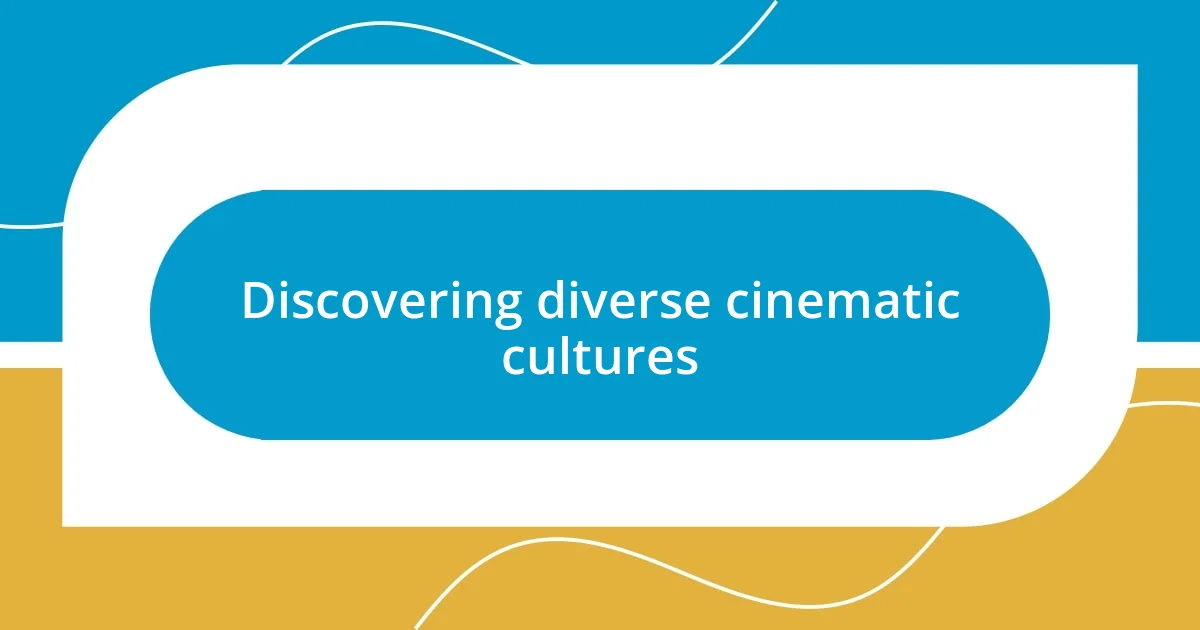
Discovering diverse cinematic cultures
Exploring diverse cinematic cultures has been a journey that never ceases to amaze me. I recall the moment I watched an Italian classic, “La Dolce Vita.” The vibrant display of life, filled with passion and drama, forced me to reflect on the richness of human experiences. The way Federico Fellini captured the essence of post-war Italy not only opened my eyes to that specific culture but also evoked a sense of nostalgia for a time and place I never knew.
In my pursuit of understanding these diverse stories, I often find that each film serves as a bridge to its culture. Here are some insights I’ve gained along the way:
- Cultural Nuances: Every smile, gesture, and pause carries layers of meaning rooted in the culture.
- Historical Context: Films often reflect the political and social climates of their times, offering a glimpse into the past.
- Universal Themes: While the settings may vary, themes like love, friendship, and loss resonate across borders, reminding us of our shared humanity.
- Culinary Experiences: Many films also showcase food as a cultural element, sparking my interest in exploring traditional dishes from those regions.
- Art and Aesthetics: The visual storytelling often reflects local art styles, which influences my appreciation of diverse artistic movements.
Each film I encounter continues to enrich my understanding of not just the stories but the very fabric of different societies.
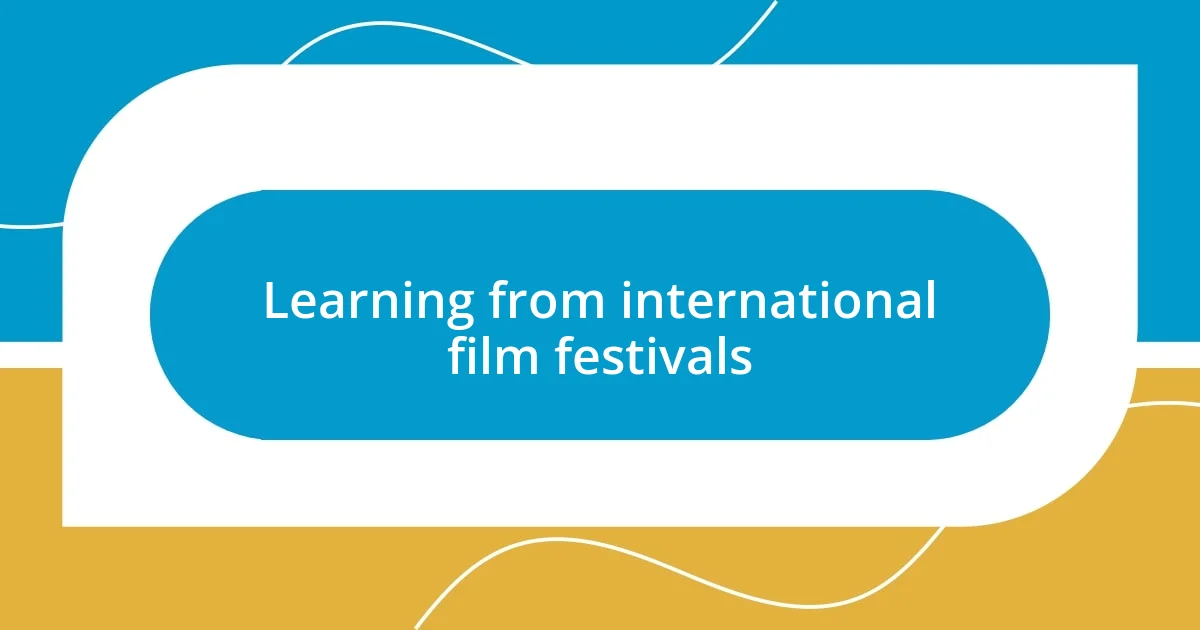
Learning from international film festivals
Learning from international film festivals has been a transformative experience for me. I remember attending the Toronto International Film Festival for the first time; it felt like stepping into a vibrant tapestry of global narratives. As I watched films from different countries, I couldn’t help but notice how each director brought a unique voice and style, making their cultural context resonate through the screen. It was exhilarating to see how emotions could be expressed so differently yet be universally understood.
I’ve also found that international film festivals provide a rare opportunity to engage in conversations with filmmakers and artists. At one festival, I had the chance to attend a Q&A session with a director from South Korea. Listening to him share his creative process and cultural influences was eye-opening. It taught me that the stories told on screen are often deeply rooted in personal and national histories, which adds layers of meaning I might have otherwise missed. The connection I felt during that interaction reinforced my belief that film is not just entertainment; it’s a shared experience that brings us closer to understanding one another.
Here’s a brief comparison of my experiences at different international film festivals:
| Festival Name | Notable Insights |
|---|---|
| Toronto International Film Festival | Diversity of voices and narratives from around the world. |
| Cannes Film Festival | Focus on artistic innovation and leading trends in cinema. |
| Berlin International Film Festival | Emphasis on socio-political films that provoke thought and discussion. |
| Sundance Film Festival | Spotlight on independent filmmakers and unique storytelling styles. |
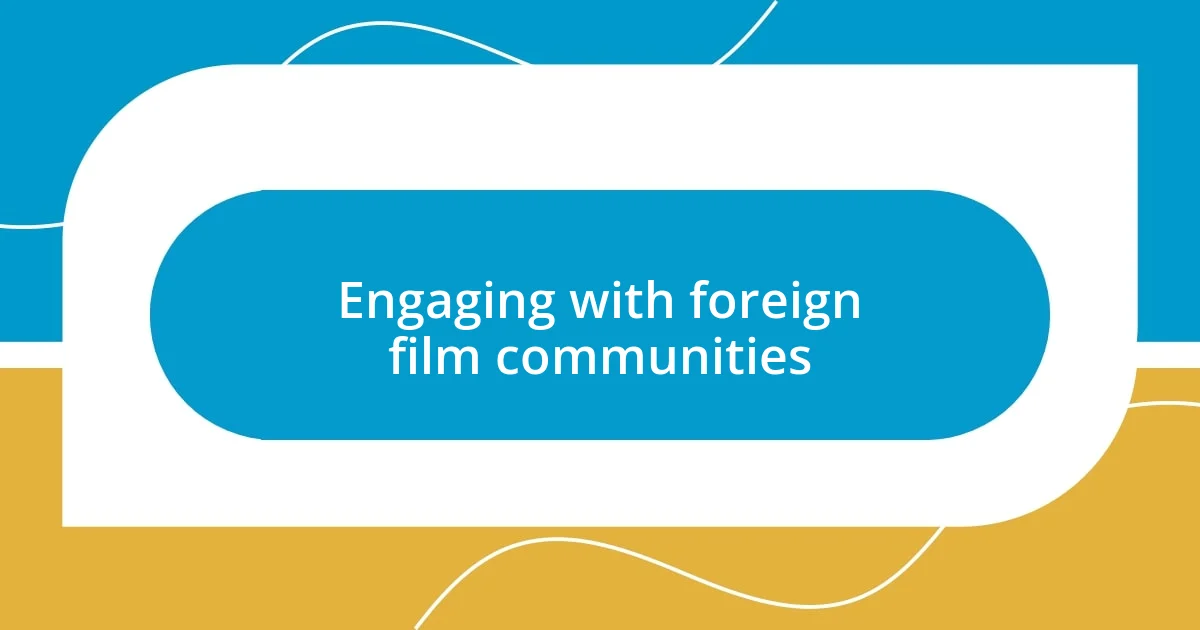
Engaging with foreign film communities
Engaging with foreign film communities truly enriches one’s appreciation of cinema. I often dive into online forums and social media groups dedicated to foreign films, like a cozy gathering of cinephiles sharing a passion for the unique. It’s invigorating to read different perspectives on films that moved me, prompting deep discussions that reveal nuances I hadn’t considered. Have you ever felt that rush of insight when someone shares a new angle on a favorite film? I certainly have! It feels like a conversation that continues beyond the screen.
During one of my explorations into a foreign film community, I joined a local Meetup group centered around French cinema. Our discussions often flowed into spirited debates about the intricacies of various directors’ styles, especially the way that someone like Jean-Luc Godard challenges conventional storytelling. The emotional connections formed in these settings are remarkable. I can still recall the excitement of sharing my thoughts on “Breathless” and realizing how much I had in common with fellow members. These exchanges not only enhance our understanding but cultivate friendships that transcend cultural boundaries.
Moreover, attending virtual watch parties has recently become one of my favorite activities. Watching films together and experiencing reactions in real time brings a delightful sense of camaraderie. I was part of a group that screened “Parasite,” and the palpable energy as we reacted to plot twists was unmatched. These moments remind me that film is a communal experience, sparking conversations that expand our horizons. Isn’t it fascinating how a piece of art can become a shared adventure, connecting us to people we may never meet otherwise? In every frame, there’s an opportunity to engage, learn, and grow with a community that cherishes the same love for storytelling as I do.
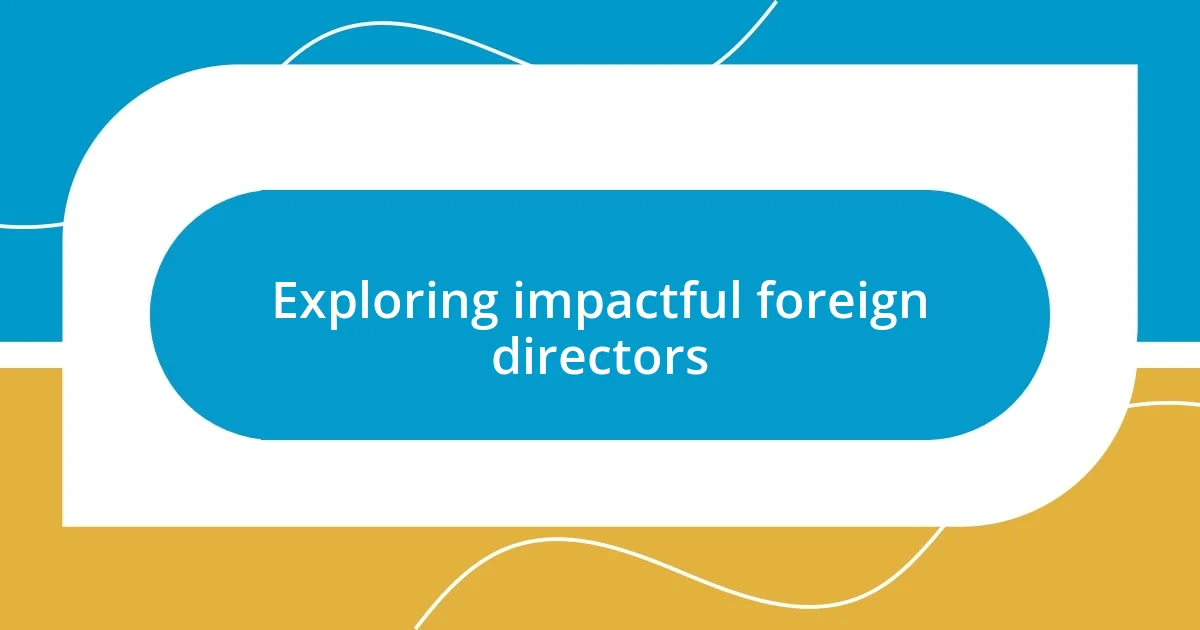
Exploring impactful foreign directors
Exploring the works of impactful foreign directors has truly broadened my cinematic horizons. For instance, watching films by the brilliant Italian director Federico Fellini opened my eyes to the creative potential of blending fantasy and reality. His unique storytelling not only challenges traditional narrative structures but also invites viewers to immerse themselves in a dreamlike experience, often prompting me to reflect on my own perceptions of the world. How can a film lead you into the depths of your subconscious while simultaneously provoking thought? Fellini’s films do just that and continuously inspire me.
Another fascinating experience was discovering the profound storytelling of Japanese director Akira Kurosawa. His ability to weave complex character arcs in films like “Seven Samurai” resonated with me on a personal level. I found myself captivated by how he delves into themes of honor and sacrifice, reflecting the cultural values of Japan while still making these concepts accessible to a global audience. Each time I watched his films, I couldn’t help but feel a deeper understanding of humanity itself—how similar yet different we all are. Have you ever felt that film has the power to bridge cultural gaps? Kurosawa certainly made me feel that connection.
Lastly, exploring the work of contemporary directors like Bong Joon-ho reinforces the impact of cultural narratives on film. His masterful blend of genres in “Parasite” is a testament to the way social commentary can be cleverly disguised within an engaging plot. When I watched it, I was struck by the uncomfortable truths it revealed about class disparity and the often-overlooked intricacies of human behavior, challenging the audience’s sense of comfort and privilege. This experience left me pondering just how much depth can be found when we expand our film palette beyond our familiar borders. Isn’t it exciting to discover the layers within stories that speak to universal themes, regardless of where they originate?
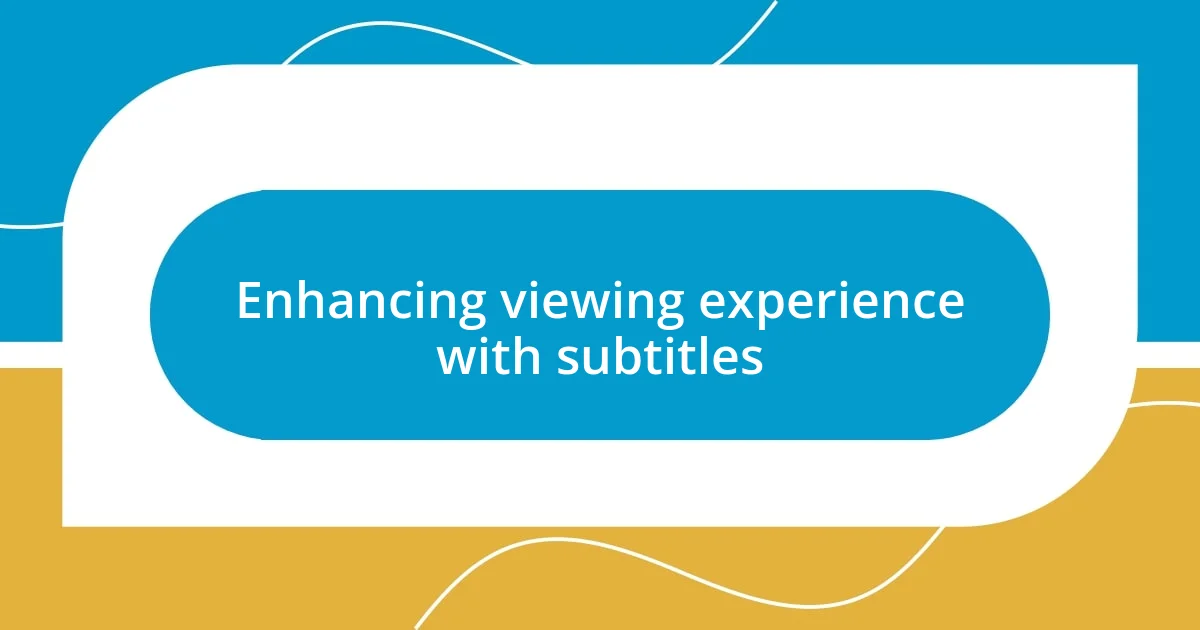
Enhancing viewing experience with subtitles
Watching foreign films with subtitles has undoubtedly transformed my viewing experience. Initially, I approached subtitles with hesitation, concerned they might distract me from the visuals. However, I soon realized that they opened up a world of dialogue and cultural context, enriching every scene. Have you ever found yourself completely absorbed in a film, only to miss vital nuances due to language barriers? I know I have, and that’s when I discovered the true power of subtitles.
I vividly remember my first encounter with a South Korean film—”Oldboy.” The intense plot twists were gripping, but it was the subtitles that allowed me to appreciate the film’s dark humor and intricate character dynamics fully. As I read the lines, the emotional weight of the actors’ performances became even more profound, giving me a deeper connection to the story. It felt like peeling back the layers of an onion; each layer revealing more about the characters and their motivations. It makes me wonder, isn’t it remarkable how text can bridge the gap between cultures and facilitate a deeper understanding of human emotion?
Subtitles also encourage active engagement as a viewer, inviting me to pay closer attention to the film’s language and cultural nuances. For instance, while watching a French romantic comedy, I often chuckle at the quick wit that’s often lost in translation. The subtleties of wordplay and expressions come to life in those moments. As I immerse myself in these languages, I feel an unexplainable excitement—like embarking on a journey that takes me far beyond my comfort zone. Have you ever felt that exhilarating sense of exploration while reading subtitles? It has truly blurred the lines between just watching a film and actively experiencing it.
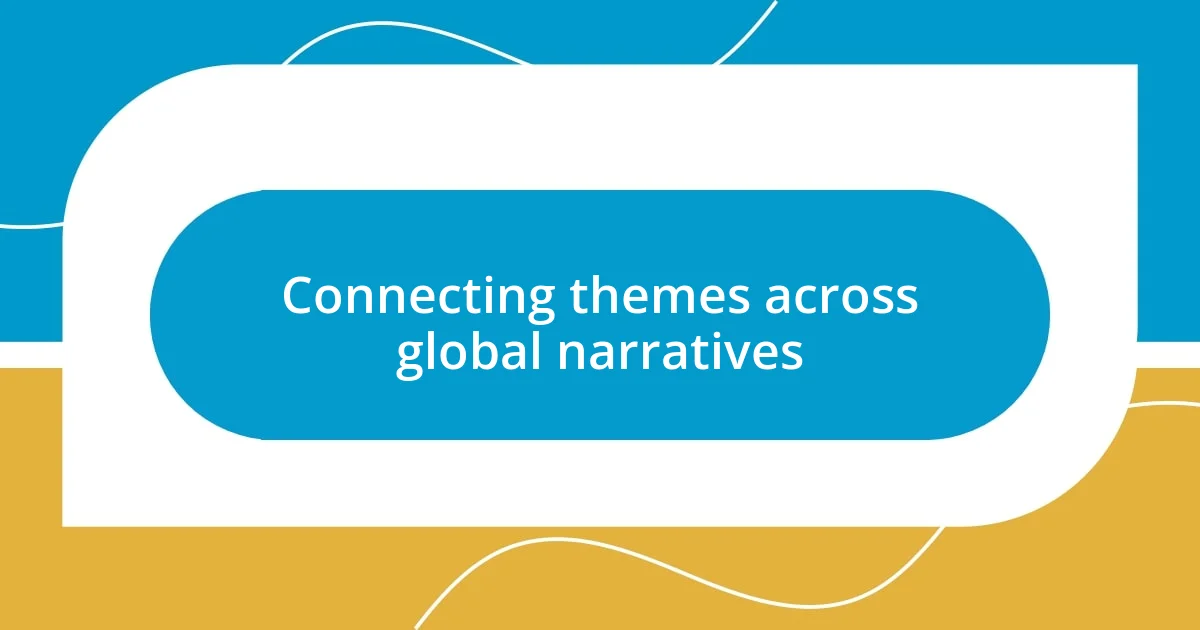
Connecting themes across global narratives
Exploring connecting themes across global narratives has been a revelation for me. When I first watched the French film “Amélie,” I was captivated not only by its whimsical storytelling but also by its exploration of loneliness and the joy of human connection. The quirky characters and their intertwined lives created a touching tapestry that made me reflect on my own journey of finding relationships in unexpected places. Have you ever felt that certain stories can resonate with your personal experiences, regardless of their cultural backdrop? I certainly did, feeling a connection to the universal quest for belonging.
My experience with foreign films also made me realize that cultural traditions often manifest in strikingly similar themes. For instance, while watching “Life is Beautiful,” I felt a familiar tug in my heart as it captured love and resilience against the backdrop of adversity. It reminded me of stories shared in my own family about courage in tough times. This crossover of experiences instilled a sense of empathy in me—where pain and joy transcend borders and unite us through shared human experiences. Isn’t it fascinating how a simple narrative can evoke such profound feelings?
Additionally, I’ve noticed how different cultures approach themes like love, sacrifice, and honor through their unique lenses. Films like “Crouching Tiger, Hidden Dragon” showcase not just breathtaking martial arts but also a deep exploration of unfulfilled love and duty. Watching it left me reflecting on the nature of sacrifice in my life and the choices we make when faced with similar dilemmas. Can art reflect our own lives so vividly? I believe it can, as each film invites us to consider our values through the stories of others.


